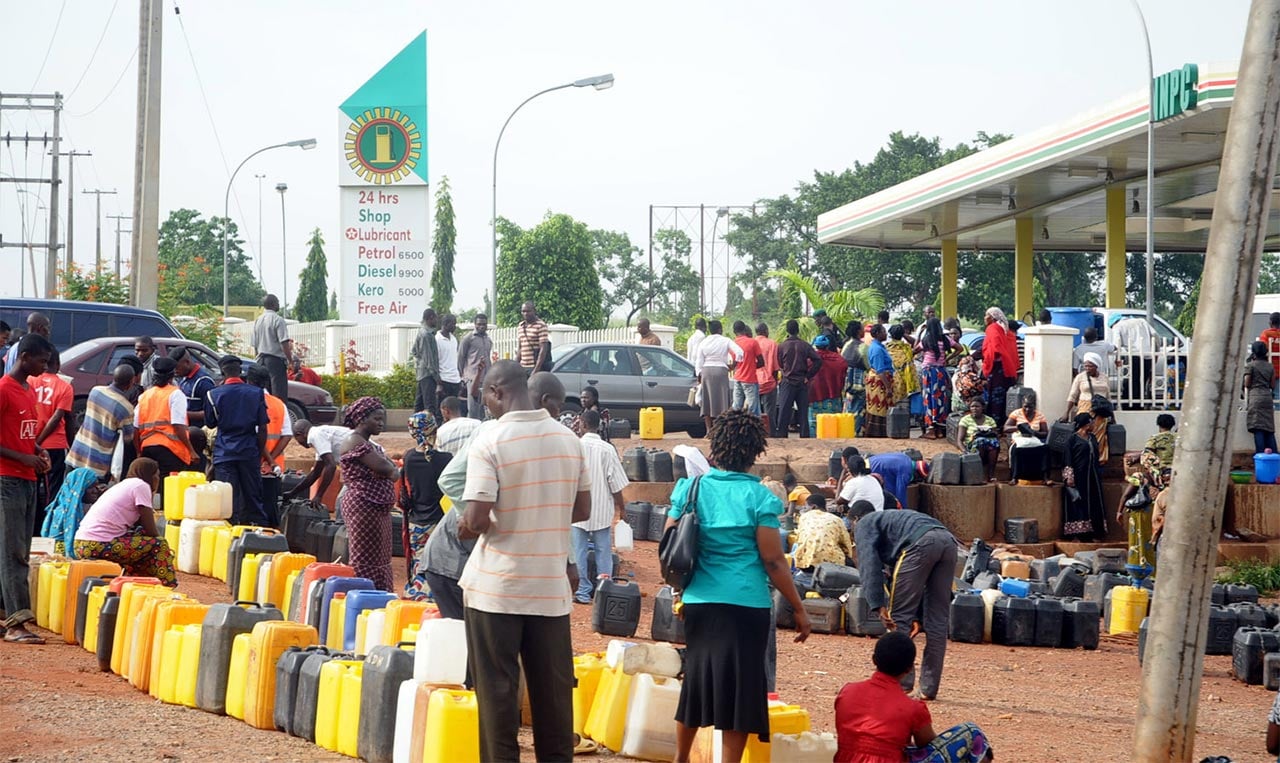Latest News
Fuel Price Crisis: Nigerians Face Hardship as Petrol Nears ₦1,000 per Litre

A fuel price crisis is gripping Nigeria, with petrol prices nearing ₦1,000 per litre at some filling stations. The scarcity of petrol has led to long queues and closed filling stations across the country.
Motorists are facing significant challenges, and commercial drivers are struggling to afford fuel, which is affecting their business.
The Independent Petroleum Marketers Association of Nigeria (IPMAN) blames the shortage on a lack of direct supply from the Nigerian National Petroleum Company Limited (NNPCL).
IPMAN members buy petrol from third-party vendors, which increases costs.
Akin Akinade, a former IPMAN chairman, explained that “Our members have no direct supply from NNPC. We buy from Third Party. We buy at DAPMAN (Depot and Petroleum Marketers Association of Nigeria) Depot in Abule Ado.”
He added that “If they bring down their price, we’re also going to bring down our price. We’re in business to make money.”
FCT/Abuja
Petrol was sold at ₦980-₦950 per litre at some stations, while motorists waited in long queues. Long lines were observed at the NNPCL station in Katampe, along the Kubwa Expressway, where motorists indicated they were prepared to spend the night to purchase fuel at ₦617 per litre.
Petrol was sold at ₦980-₦950 per litre at some stations, while motorists waited in long queues. Long lines were observed at the NNPCL station in Katampe, along the Kubwa Expressway, where motorists indicated they were prepared to spend the night to purchase fuel at ₦617 per litre.
At the Umaru Ngelzarma Filling Station locatein the Lokogoma area of Kabusa District in the FCT, petrol was sold at ₦980 per litre.
Additionally, at Christee’s Petrol Station, also situated in the Lokogoma area of Abuja, the price for the product was recorded at ₦950 per litre. Numerous fuel stations in Abuja were closed, while the few that were operational experienced extensive queues.
Lagos
Journalists reported long lines at NNPCL stations offering fuel at ₦568 per litre, while other stations such as Mobil, MRS, and North West charged between ₦600 and ₦650 per litre.
Journalists reported long lines at NNPCL stations offering fuel at ₦568 per litre, while other stations such as Mobil, MRS, and North West charged between ₦600 and ₦650 per litre.
Commercial drivers expressed significant worries regarding the ongoing scarcity and the steep price increases at the limited stations that are still operational.
Omotayo Adenikeju, a transporter, told newsmen that “The hike in fuel price is the major problem we have in Nigeria. I bought ₦900- ₦950 in Calabar, that is why I have not travelled again. It is affecting our business.
Commercial drivers shared their significant worries regarding the ongoing scarcity and the steep price increases at the limited stations that are still operational.
Kano
Motorists reported purchasing fuel at ₦950 per litre from independent oil marketers’ stations, while NNPCL stations offered it at ₦620.
Motorists reported purchasing fuel at ₦950 per litre from independent oil marketers’ stations, while NNPCL stations offered it at ₦620.
A commercial driver, Habibu Sani, expressed a preference for waiting in line at the NNPCL station rather than paying over ₦900 for a litre of fuel.
Another driver, Kabiru Yakasai, stated that he had to park his vehicle due to the unaffordability of fuel priced above ₦900 per litre.
At an AY Maikifi outlet on Maiduguri Road, it was noted that fuel was being sold for ₦900, while A.A. Rano Station on Gyadi-Gyadi Zaria Road was dispensing it at ₦730.
Maiduguri
Virtually all the NNPCL filling stations in the Borno State capital were closed.
Virtually all the NNPCL filling stations in the Borno State capital were closed.
A driver, Aminu Idris, said: “We cannot afford to buy petrol from independent marketers at ₦950”.
Oyo
Fuel was sold at ₦850-₦900 per litre at several filling stations in the Oke-Ogun axis of Oyo State. Black markets around this region of the state currently sell the product at exorbitant prices.
Fuel was sold at ₦850-₦900 per litre at several filling stations in the Oke-Ogun axis of Oyo State. Black markets around this region of the state currently sell the product at exorbitant prices.
CSO’s Reaction
The Human Rights Writers Association of Nigeria (HURIWA) has criticized the federal government’s response to the crisis.
HURIWA alleges that the NNPCL may be benefiting from the scarcity and that the government has not done enough to resolve the issue.
HURIWA’s National Coordinator, Comrade Emmanuel Onwubiko, stated that “Despite the various excuses provided by the NNPCL, the fuel price crisis persists, leading to speculations that the company may be benefiting from the situation.”
He added that “In the past three months alone, the NNPCL has churned out no fewer than five different excuses for the ongoing fuel scarcity, ranging from logistics challenges to supply chain disruptions.”
Furthermore, “The simultaneous occurrence of fuel scarcity and the reported challenges faced by the Dangote Refinery suggest an orchestrated effort to undermine the refinery’s operations, further entrenching the NNPCL’s monopoly over Nigeria’s petroleum industry,” HURIWA alleged.
As of now, the NNPCL has not issued an official statement regarding the fuel price crisis.
More News:
